-
Matthieu Amalric: The Screen Illusion (2011)
MATTHIEU AMALRIC: THE SCREEN ILLUSION (2011)
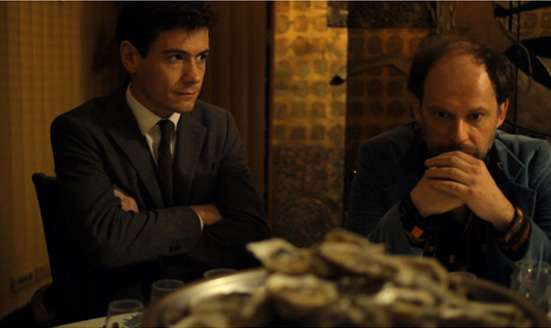
LOÏC CORBERY AND DENIS PODALYDÈS IN THE SCREEN ILLUSION
Youthful Corneille as a cool crime drama, for television
Amalric's Screen Illusion/L'illusion comique is a shortened modern dress for-TV adaptation of the play written in 1636 by the French playwright Pierre Corneille. It's the third in a series commissioned by the Comédie Française using only their actors doing plays they've been performing on stage, made away from the theater in an original format in only twelve days, and requiring that for the revised text words may be cut, but not altered or added to. The previous two adaptations were by Claude Mouriras, and by the team of Olivier Ducastel and Jacques Martineau.
L'illusion comique uses a play-within-a play structure with an interestingly modern and Nabokovian twist: one man actually watches a play, deluded into thinking it is a privileged version of the real. L’Illusion comique runs through a gamut of genres that sound like Polonius speaking of the players: pastoral followed by comedy with a farcical character at the center, followed by tragicomedy – it’s a dramatic tour de force in which Corneille, still early in his career at 28 and just starting to become famous, shows himself to be already at the top of his theatrical game. Or so Wikipedia says. It's a youthful work. But it's notably adventurous and ahead of its time and surreal, and that makes it good material for a modern transformation. And perhaps safer for Amalric, not to be risking accusations of mangling an absolute top classic, even if it's by one of France's greatest playwrights.
This is a seventeenth-century play in alexandrine couplets. That has not changed in the least, though the actors, who are trained to perform the lines on stage, deliver them with maximum fluency, and adapt to the modern settings and reinterpretations like the consummate pros that they are. The visuals are consistently and realistically modernized -- set in the present time and mostly based in the posh Hotel du Louvre, with farcical scenes in the rooms, and other action at a parking garage, a shootout happening on the roof, and a nightclub confrontation when reality finally replaces illusion. But the language remains the same as it was.
To begin with Pridamant (Alain Lenglet) has lost track of his son Clindor (Loic Corbery) for a decade and desperately misses him and (in the original) enlists a magician Alcandre (Herve Pierre), to help him see where his son is and what he is doing. The magician in this version is replaced by a concierge/security guard/detective at the hotel, and the magic visions are replaced by a battery of security camera screens and cassettes that Alcandre shows to Pridamant. The important thing is that Amalric finds something cinematic -- and perhaps also telivisory, as an equivalent, particularly, with the security cameras and screens. But I honestly did not on one viewing know the play well enough or follow this filmed-for-TV version with sufficient understanding to appreciate the transformation. It seemed a little like slight of hand to me, a series of assumptions we agree to go along with that may not in the end be all that convincing. How stupid or gullible is this Pridamant? We do not, of course, watch everything on CCTV monitors. We get a glance at one, or at a playback, and then we shift to the actors in the rooms, and have to pretend Pridamant is, what? still watching the monitor? Amalric expects us to take big leaps here, and it's all just as artificial as alexandrines or as a 17th-century play performed in 17th-century costume.
Clindor is working for a video game exec Matamore (Denis Podalydès), the man behind "Modern Warfare 2." In the original Matamore is a boastful military officer. Matamore claims to adore Isabelle (Suliane Brahim), but her father Géronte (Jean-Baptiste Malartre) plans for her to marry Adraste (Adrien Gamba-Gontard). Meanwhile Cindor and Isabelle are in love with each other. But another woman, Lyse (Julie Sicard), is opposed to this relationship because she is in love with Clidor too and wants him for herself.
Clindor is attracted to one woman but desirous of the other because she has the wealth and the power he wants. And he flirts with additional ladies. And other people are plotting whom he should be hitched to. The play is more complicated in the original than this simplified version: Amalric has cut out subplots. The main lines are easier to follow on screen thus simplified, but at times a scene seems to lack a proper introduction. And it can be hard to follow the basic action as well. I felt as I do at the opera, which is to say out of my element.
Nonetheless one can see Corneille himself as the magician; and Amalric as a meta-magician in transforming the play into a still more stylized modern version that reinvents something quintessentially theatrical into something set out in a realistic modern world. And in turn the actors, who were peroming the play in its more traditional mise-en-scène on stage every day at night while shooting the film version during the day, perform prodigies of imagination and energy and collaboration of their own. In an interview on stage at Rotterdam Almalric described the cast as his collaborators.
A Screen Daily article suggests comparing this reworking of Corneille to Michael Almereyda’s 2000 "slacker" Hamlet . Yes, but we know Hamlet and we don't know this play. As English speaking viewers we are lost.
We could compare Ralph Fiennes' current filmed updated Serbian Coriolanus, which is so realistic and gritty (it took more than 12 days and a lot of explosions, more I think that were necessary) with its tattooed serbian hunks, and Fiennes' performance is so in-your-face, you forget, at key moments anyway, that you're listening to Shakespearean English, or cease to care. Not sure that happens with Corneille's 17th-century French here, but it might happen for French viewers and not for us.
Amalric is a supremely intelligent and thoughtful actor and director, but his directorial projects have not been as good as his acting, so far. His On Tour/Tournée (SFIFF 2011,done only a little before this project) was ecstatically received in France, but seemed contrived to me, and Screen Illusion seems another fascinating idea that unfortunately fails to engage us as fully as it engaged Amalric. But my respect for Amalric remains enormous.
L'Illusion comique AKA The Screen Illusion, was screened for this review at a press and industry showing at the Walter Reade Theater of Lincoln Center. The film, only 77 minutes, made for French public television, will be included in the 2012 joint UniFrance and Film Society of Lincoln Center presentation, The Rendez-Vous with French Cinema Today. The public screening schedule will be as follows:
*Sun., March 4, 6:15pm – WRT; *Sun., March 4, 9pm – BAM; *Mon., March 5, 8pm – IFC; *Tues., March 6, 4pm - WRT
*In person: Mathieu Amalric
Last edited by Chris Knipp; 02-16-2012 at 04:51 PM.
-
Daniel auteuil: The well-digger's daughter (2011)
DANIEL AUTEUIL: THE WELL-DIGGER'S DAUGHTER (2011)
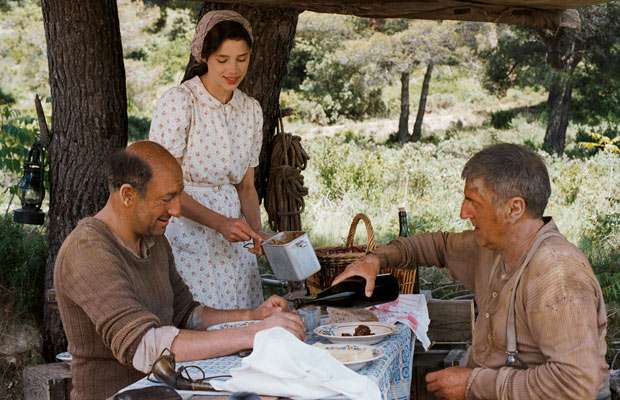
MERAD, BERGÈS-FRISBEY AND AUTEUIL IN THE WELL-DIGGER'S DAUGHTER
Auteuil brings back Pagnol
Old fashioned, arguably retro values dominate Auteuil's Pagnol remake The Well-Digger's Daughter/La Fille du puisatier, a story of bad fortune reversed and meanness turned into decency. Nothing earth-shaking here, but the kind of movie that leaves mainstream audiences feeling good. There is an affirmation of simple country values and a look at the issues of class and illegitimacy and the vicissitudes of war. This version adheres closely enough to the 1940 original, but despite the well-digger and his assistant's preserving their heavy Provençal accents, otherwise the film is less naturalistic and more mainstream than the original, also glossier and better looking, with higher production values. Do we need this done over again? Somebody obviously thought so.
Auteuil's return to Pagnol material marks the twenty-fifth anniversary of his debut in the two-film Pagnol novel adaptation of Jean de Fleurette and Manon of the Source (directed by Claude Berri), a French series hugely successful with US art house audiences. This time it's the now 62-year-old actor's show: he stars, wrote the adaptation of the original film, and directed. And he has made the well-digger Pascal Amoretti's character even stronger -- and more intensely conflicted -- than the blocky, gruff figure embodied the first time by Raimu.
The story's pretty simple. Amoretti calls his titular 18-year-old daughter Patricia (Astrid Bergès-Frisbey) back from being educated by nuns in Paris to take care of his five other younger daughters in Provence. Her good looks and manners and proper French much attract Jacques Mazel (Nicolas Duvauchelle), the putatively dashing pilot son of M. Mazel (Jean-Pierre Darroussin), the rich local owner of a hardware store. A couple of dates and rides on a motorcycle get Patricia pregnant. She has fallen for Jacques, but the war's breaking out and Jacques is off to the front, and so is Pascal's simple, good-humored assistant Félipe (Kad Merad), who wanted to marry Patricia before this happened. Mazel senior and his ditzy, hysterical wife (comedic vet Sabine Azéma) are not friendly when Pascal comes with all his daughters to inform them of Patricia's condition and the fact that their son is responsible. Then Jacques is shot down and they are devastated. And things change, and change again.
Darroussin adds an authentic severity to his part; Azéma and Merad are a little too light and comedic, and Azéma really overdoes it. The formerly bad-boy Duvauchelle is a bit too low-key: he's more slinky and creepy than really dashing here, alas. Bergès-Frisbey has a delicacy and sensitivity that are good for the role of Patricia, but she's also a bit bland. In truth though the story line is so simple, involving, and well worked out than no one actor, or character, is crucial. Auteuil does not hesitate to make his role and performance even more central, creating a Pascal more solid and intense than Raimu's 1940 version. Auteuil's Pascal is violent and almost cruel with Patricia when he thinks he must abandon her cause, and melting and sweet when he has a change of heart . His big encounters with M. and Mme. Mazel are peculiarly emotional and dramatic. He winds up being the most interesting actor to watch, but he keeps the cast and the tone nicely balanced (with the slight exception, again, of Azéma).
As is usual with Pagnol, the south of France material is warm and humanistic, and is a time capsule, a portrait of cultural values much changed since. With its bell-ringing musical background, the London Symphony strings coming in at appropriate touching moments and the super-happy ending, this is a movie that offers little for sophisticates. But its still a good story well told and like those earlier movies it's likely to delight the segment of the art house audience that is looking for charm rather than edginess. Those who can't wait for the film's summer 2012 US release can watch it during the Lincoln Center-UniFrance Rendez-Vous with French Cinema series. And the producers were so pleased with Auteuil's handling of this Pagnol outing, they hired him to do the earlier Pagnol film trilogy, Marius, Fanny and César, which will come out later this year.
This film opened in Paris to generally good reviews, which approved Auteuil's directorial debut and were justifiably impressed by his own strong performance. Knowledgeable observers however still consider the Pagnol originals, overall, superior. And there is no denying, and some French critics affirmed, that this is very far from being a fresh and exciting new work or approach.
La Fille du puisatier will be released by Kino Lorber in the US in the summer of 2012. It is also part of the Film Society of Lincoln Center-UniFrance Rendez-Vous with French Cinema series for 2012 and was screened for press and industry, when it was observed for this review. The series runs at several venues in New York City from March 1-11. Public screenings for this film are:
*Thurs., March 8, 8pm – IFC; *Sun., March 11, 3:45pm – WRT
*In person: Jean-Pierre Darroussin
Last edited by Chris Knipp; 02-14-2016 at 08:57 AM.
-
Ismaël Faroukhi: Free Men (2011)
ISMAËL FAROUKHI: FREE MEN (2011)
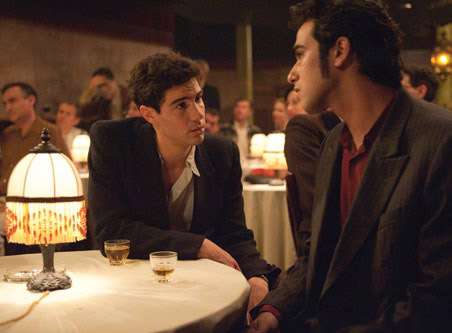
TAHAR RAHIM AND MAHMOUD SHALABY IN FREE MEN
Muslims and resistance in German-occupied Paris
The young star of Audiard's amazing 2009 A Prophet/Un prophète is back in the 2011 Free Men/Les Hommes libres, a film about a young Algerian in Paris in 1942 inspired to join the resistance by his friendship with a Jewish man. In 2009 Tahar Rahim won Best Actor at the French Césars; A Prophet won the Grand Prix at Cannes. Free Men again gives the young Rahim the central role. This is two or three films. Again, it sets up Rahim as a young man being formed into something stronger. Come from Algeria to work in a factory, his Younes got TB and recovered but lost his job. As a black marketer getting by, he's caught in a raid and recruited at police headquarters where it's believed the muslims are issuing false documents.
But this is also indirectly a biopic about Si Kaddour Ben Ghabrit (played by the venerable and monumental Michael Lonsdale of Beauvois' Of Gods and Men and many other great films), founder and rector of the Great Mosque of Paris, who aided the anti-Nazi resistance. It's the story of the resistance, of which Younes becomes more and more a part. The friendship that leads him to want to help protect Jewis is with Salime, a superb Algerian singer and musician, reputedly the best in Europe, who turns out to be Jewish. While Jews and Arab Muslims are seen as at each other's throats, it is interesting to learn that their twin outsider status made them allies in Paris under the Vichy government.
Des hommes libres is also a celebration of the marvelous Arab music of the period, and its musical interludes are the highlights of the film and symbolize music's power to transform and unify and transmit culture, even under the most repressive conditions of German occupation.
And Les hommes libres' undercurrent is the birthing of the Algerian independent movement, which all the Algerian political activists in Paris at this time are aware of and involved in, and which gains great impetus by the Liberation, which made the Algerians see allies in the Americans and their own liberation from French colonial oppression in the liberation of the French from Nazi occupation.
The essentiality of Free Men is that it represents an unrecognized story of a role played during the war by maghrebins, North African Arabs, in the attempt to save Jews from Nazi extermination. It's another story that needed to be told and it's an interesting one. After all, France has the biggest muslim population of any country in Europe. They matter. And the Algerians' relationship with the French is a complex one.
Tahar Rahim again has the role of a tabula rasa, a young man of little personality or character who is changed by strong events as he was changed by prison in A Prophet and by his association with the Corsican capo played by the great Niels Arestrup in Audiard's film. Little by little Younes, who spends more and more time at the mosque to satisfy his Vicny police handlers gives up trading on the black market. He does it for profit, and then begins to care.
The singing of the charismatic, popular and blue-eyed Salime Halali delights Younes. He also is attracted to Warba Shlimane alias Leila (Lubna Azabal of Incendies), who turns out to be a communist activist in hiding, and he saves a couple of Jewish children turned over to him where he lives. The Grand Mosque Rector is increasingly menaced by the Nazi officer Major von Ratibor (Christopher Buchholz), whom he wards off with deftness and aplomb.
Free Men is an interesting picture of historical events, but its meandering structure is in search of driving central action or more intense development on the part of Younes, a composite character created to pull together all the action of muslim resistance volunteers gathered around the other specific historical figures. It's going to be hard for Tahar Rahim to get another role as strong as the one he played in A Prophet -- unless he can work with Audiard again or someone of his caliber. Israeli-Arab actor Mahmoud Shalaby, who plays Salime, seems promising. Unfortunately the writing falls short. Two many paths in too many directions.
Too bad, because this is a worthy subject and Free Men has its own unique atmosphere of an unseen world inside occupied Paris. The film sings literally and figuratively during the passages of live musical performance. When an actor playing great Egyptian singer-songwriter Mohamed Abdel Wahab, thin and in dark glasses, appears performing with Salime at a cafe, it recreates a magic moment for fans of modern Arabic music.
Les Hommes libres opened in Paris September 28, 2011 to fairly good reviews (Allociné 3.0) that recognized an honest effort, but some spoke of "missed opportunity" and a plot and a too diffuse plot. It's a "modest recreation" -- perhaps too modest. But this is not a dead end for Rahim, who has been in Kevin Macdonald's The Eagle; will be in Lou Ye's Love and Bruises; and in another shot during the Turnisian revolution. He describes himself in an Inrocks interview: "I continue to grow. I'm finding a focus for my anxiety."
Free Men was observed at a press and industry screening for this review in preparation for the Rendez-Vous with French Cinema, the joint festival of the Film Society of Lincoln Center and UniFrance, March 1-11, 2012. Public screenings:
Fri., March 2, 1pm – WRT; *Sat., March 3, 9:15pm – WRT; *Sun., March 4, 4pm - IFC
*In person: Ismael Ferroukhi and Tahar Rahim
Last edited by Chris Knipp; 02-16-2012 at 04:50 PM.
-
Mathieu Demy: Americano (2011)
MATHIEU DEMY: AMERICANO (2011)
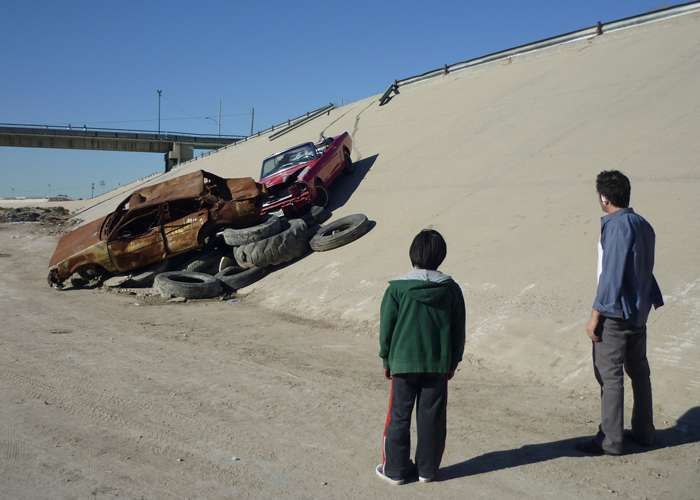
A man seeks his lost youth in America
This directorial debut (in which he is the protagonist) is by the son of two French cinematic icons, Jacques Demy and Agnès Varda, and it contains elements of both of them, a documentary quality from his mother and a romantic idealism from his father. The mysterious woman Martin (Demy) stalks in a Tijuana dive has the name of Jacques Demy's glamorous object of desire played by Anouk Aimée, Lola. Martin's girlfriend in Paris is played by Jacques' muse Catherine Deneuve's daughter, Chaira Mastroianni. Martin's exploration of his childhood is illlustrated with actual clips of Documenteur, a film by Varda showing her with a childhood Mathieu. And with these credentials, this film was well received by French critics and richly resonant for French audiences. But it may seem pretty sketchy and unsatisfactory to American audiences. Selma Hayek adds sexiness as Lola, and Geraldine Chaplin plays a family friend. Images are shot in a grainy, hot-colored 16mm, and music is supplied by Georges Delarue. The mixture of elements here is both haunting and disappointing. The film was acquired at Toronto for US distribution by MPI.
As Americano begins Martin learns that his mother has died in Venice, California. A dual US-French citizen who now sells real estate in Paris with a not very committed relationship with his girlfriend, he decides to go back and sell his mother's place and clear up her things, arranging for her body to be sent back to France for burial. He harbors lingering resentments against her out of a sense of abandonment. She had a nervous breakdown when he was of eight, when his father (director, actor, screenwriter Jean-Pierre Mocky) left her and took the boy to live permanently in France. Martin arrives in L.A. and is met by the annoying Linda (Chaplin), a friend of his mother who insists she was a joyful person and not the depressive Martin has always imagined. Throwing things out, Martin finds an old photograph that shows him as a child with a Mexican girl he used to play with. A returned letter from his mother indicates this Lola was the one his mother wanted to leave her place to and an American lawyer has told him a deceased person's inheritance wishes should be met. He then grabs Linda's red Mustang convertible and goes hunting for Lola.
The rest of the film is a sequence of vicissitudes in which a dogged Martin pursues the actual (or is she?) Lola, whom he played with as a child twenty-five years ago, and mentally explores his lost early childhood. She denies the past and he is repeatedly rebuffed by a heavy called Luis (Carlos Bardem), who beats him up. A boy who has directed Martin to the club called Americano where Lola is a pole dancer does not prevent Linda's red Mustang from being stolen, and with it Martin's money and passport. He is not in very good shape. He keeps calling Claire (Mastroianni) from pay phones, which she finds odd: he has never been that loyal and their relationship had reached an impasse.
This film in retrospect has, certainly, many suggestive elements, but it didn't work very well in the actual unreeling. The various elements do not hang together well enough and the protagonist is hard to get a grip on. As the glamorous, sexy, but scarred Mexican babe, Selma Hayek has a certain attraction, but the flashbacks are arbitrary; events including a snowy burial in France seem unrelated, Geraldine Chaplin (perhaps happily) forgotten, Chiara Mastroianni just an occasional flicker at the end of a phone line. It is difficult to make a story out of a void, and Demy's Martin has been estranged from his mother for much of his life (though his dual background has left him bilingual).
The film debuted at Toronto in September 2011, and opened in Paris November 30 to generally favorable reviews, though one French critic remarked that nothing is more frustrating than a road movie that leaves the viewer on the road. The iconic elements that go into the film as well as the sun-drenched American images of Venice, California and Tijuana may resonate with any audience looking more for atmosphere than structure.
Americano is a part of the Rendez-Vous with French Cinema, March 1-11, 2012, staged by the Film Society of Lincoln Center and UniFrance. Public screening schedule:
*Sat., March 3, 6:30pm – WRT; *Sun., March 4, 6:45pm – IFC; *Tues., March 6, 7:30pm - BAM
*In person: Mathieu Demy
Last edited by Chris Knipp; 02-16-2012 at 04:49 PM.
-
Robert Guédiguian: The Snows of Kilimanjjaro (2011)
ROBERT GUÉDIGUIAN: THE SNOWS OF KILIMANJJARO (2011)
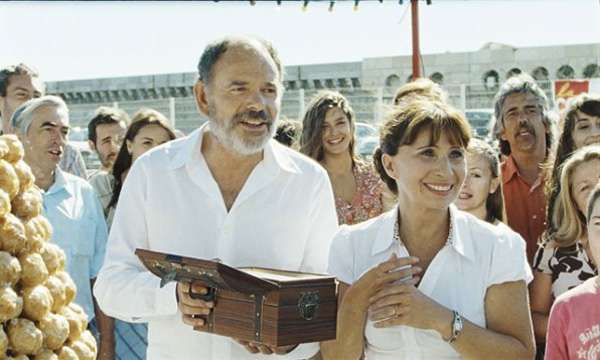
JEAN-PIERRE DARROUSSIN AND ARIANE ASCARIDE IN THE SNOWS OF KILIMANJARO
Tell what you know: Marseille, early-retired dock workers, and the social contract
This is a film in which French Armenian filmmaker Robert Guédigian does what he does best: a warmly humanistic film about socio-economic issues. If the Dardenne brothers always made films using a cast of old friends and family and set them in the same warm Mediterranean setting, you'd get the Guédigian of The Snows of Kilimanjaro.
It's all a little too good to be true, but the filmmaker's working methods are so smooth and his regular cast members, many his friends, are so adept and so appealing the messages go down easy and warm the heart. The basic one: people's actions are explainable by social and economic causes and not due to moral or personality defects.
Michel and Marie-Claire (Jean-Pierre Daroussin and Ariane Ascaride) are "middle-class, but not completely," they agree. They live on the cusp between complacency and anger so they can see the possibility of either mood. They can sit on their balcony enjoying the sun in the late afternoon and they own the place where they live. But they know how hard it was to get there. Marie-Claire gave up nursing school years ago and takes care of an old lady and Jean was forced into early retirement from his dock worker job. A union rep himself, he conduced a drawing to lay a group of people off and put his own name in the box.
A big joyous party takes place to sweeten the pill Jean has chosen to swallow. It's so naturally and wonderfully staged (packed with the director's regulars and friends) that you wish you could be there. Present are Jean's coworkers and some of those laid off, Jean and Marie-Claire get a present: a box of cash, and tickets for a two-weak trip to Kenya. Also Jean's best buddy since childhood Raoul (Gérard Meylan) gives him a comic book he used to own that disappeared, the first one he every bought. The couple start getting ready for the trip. Jean, unwilling to learn the "colonial" language, English, starts studying Swahili.
Not long afterwards Jean, Marie-Claire, Raoul, and his wife Denise (Marilyne Canto) are having an evening of cards when a couple of young masked men break in with pistols, tie them up, and take the money from the party as well as the tickets and their credit cards. One of them goes off with the comic book. Denise is very traumatized. Jean gets knocked over and his shoulder gets injured.
One of the bad guys turns out to be one of the laid off guys. The way all this is resolved has policier elements, and also some intense speeches that explain opposing points of view. Because the filmmaker's working methods are so smooth and natural, it all goes down easy. Having recently seen only Guédiguian's noirish thriller Lady Jane (SFIFF 2008) and his WWII historical film about foreigners involved in the French resistance, The Army of Crime, which like this employs Grégoire Leprince-Ringuet, and it's been quite a while since I saw his social portrait The Town Is Quiet (2000), I was not really aware of how winning the director is when working in every sense on his home turf. (But from French reviews, even they had tended to take him for granted and forget how "essential" he is.) There is a great deal of warmth here, a great many home truths, plenty to think about. It's almost as if Brecht were a real charmer, and his characters turned to you and gave you little lectures, but totally in character, as if they were not theatrical devices but real people really talking to you.
Christophe (Leprince-Ringuet) has two little brothers. Eventually Marie-Claire tracks down their mother, and she explains vociferously why she's left them in the 22-year-old now out-of-work Christophe's care. In a word: men. Nobody is wrong here. Even the police commissioner (played by the interesting Robinson Stévenin) who helps Jean with his problem is basically nice. As mentioned it's a little too good to be true; but it's not too good to be both enjoyable and instructive, dulce et utile. This is an unusually a fine piece of committed cinema. Because the points made are straightforward and clear does not meant they aren't true. Probably the best made and most valuable film in the 2012 Rendez-Vous press screenings so far.
Les Neiges de Kilimanjaro debuted at Cannes May 2011, and opened in Paris November 16, when it was enthusiastically received by the capital's generally left-leaning critics (Allociné 4.1).
This film is included in the joint UniFrance-Film Society of Lincoln Center presentation series from March 1-11. Public screening schedule:
*Tues., March 6, 7:45pm – IFC; Thurs., March 8, 1:30pm – WRT; *Sat., March 10, 9pm – WRT
*In person: Jean-Pierre Darroussin.
Last edited by Chris Knipp; 03-27-2012 at 07:03 PM.
-
Jean-françois laguionie: The painting (2011)
JEAN-FRANÇOIS LAGUIONIE: THE PAINTING (2011)
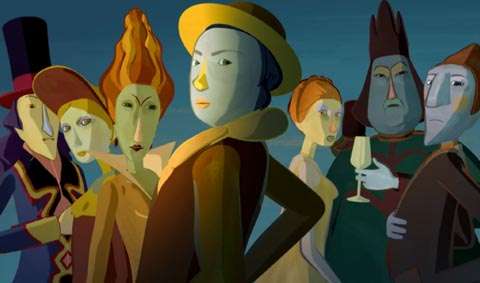
SNOBBISH "FINISHED" FIGURES IN AN UNFINISHED PAINTING
A hierarchy of creation leads to a painting revolt
From veteran French animator Jean-François Laguionie (of A Monkey's Tale; Gwen, the Book of Sand; and other films) comes The Painting/Le Tableau, a lush 76-minute animated feature focused on figures in a painting. The artist has left some of them unfinished, abandoning the canvas for years. And in the interlude a caste system has developed. The Toupins or "all painted" people lord it over the Pafinis, the "not finished," excluding them from the chateau. As for the Rofs, the merely "sketched" -- lines without color who have trouble finishing their sentences -- these the "all painted" ones treat as worthless and try to destroy. And so there is a hierarchy of creation in which some believe themselves more favored and use an aesthetic basis for their exclusionary policies. Yet what did the artist intend? Is he finished? Or will he return? These ideas form the basis for a somewhat meandering philosophical tale. They are so suggestive and the images so beautiful perhaps it's inevitable the results fall a bit short of our expectations. We can also perhaps forgive the story for wandering away from its main themes at times in search of pure adventure or visual stimulation.
Eventually we follow a few main characters on a journey that leads outside their canvas and into other ones, beyond to the dingy studio, and finally outside in what we might call the “real world,” where the most adventurous Pasfini finds the now venerable white-bearded painter. As we might have expected, in old age he has turned to simple landscapes en plein air, because it's "less difficult." It seems from a tour of the studio that he became Picasso, and then Miro or Mondrian, and now he is late Braque.
There are the inevitable amants maudits, the star-crossed lovers. Ramo, a Toupin youth in love with a Pasfinie girl, rejects the discriminatory system and wants to lead a revolt. Driven out of the chateau, he and Plume (a Rof) and Lola, a bold and confident Pasfinie, go in search of the artist. They explore the over-lush garden outside and brave the menacing forest and then, if they can escape the limits of the canvas itself, who knows? They may find find the artist and persuade him to finish his work. But before that they enter, half by accident, the worlds of several other paintings.
The theme offers the opportunity for play with styles and color. In a sense that's what it's all about. For some of us Rofs like "Plume" who are only a few lines may be more appealing and suggestive than the conventionally painted, old-style Toupins.
In the studio the explorers meet a large and langorous nude, once the artist's mistress. They also make their risky way into a painting of Venice; one of them unwittingly takes a gondola ride with Death. It looks great fun to be in Venice at festival time but they learn that celebrating every day is a drag. At sunset there are dozens of artists, and they find out what they can do: become artists and finish themselves! They get bags of paint, and returning to the colony of unfinished people. At first it's a great mess, but when they develop some skill and enter the chateau in multicolored finery their originality makes the snobbish Toupin people terribly jealous.
And then there is the inevitable twist: the worlds within worlds. The artist Lola finds is real (he's not animated), but the field they're in has a big frame around it. Who painted you? asks Lola.
The Painting received César nominations and critical raves (Allociné 4.1) but was less of a winner at the French box office. It was seen at the Annecy Festival and opened in Paris cinemas November 23, 2011. It is included in the joint March 1-11, 2011 UniFrance-Film Society of Lincoln Center series, Rendez-Vous with French Cinema, and was watched at a presss screening for the series for this review. It is presented in collaboration with the New York International Children's Film Festival. Public screenings will be:
Sat., March 3, 1:15pm – EBM; *Sun., March 4, 11am - IFC
*In person: Jean-François Laguionie
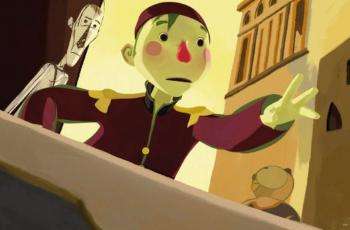
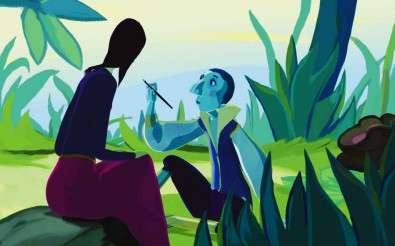
RAMO GETS TO TOUCH UP HIS BELOVED'S FACE BECAUSE SHE'S A PASFINIE
Last edited by Chris Knipp; 02-17-2012 at 05:52 PM.
-
Jalil Lespert: Headwinds (2011)
JALIL LESPERT: HEADWINDS (2011)
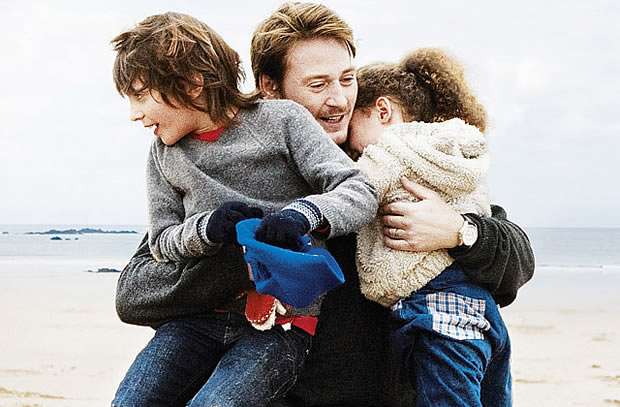
BENOÎT MAGIMEL WITH HUGO FERNANDES AND CASSIOPÉE MAYANCE IN HEAD WINDS
Trouble resolved in Brittany
Jalil Lespert is the star of two of my favorite contemporary French films, Laurent Cantet's 1999 labor union drama Human Resources and Xavier Beauvois' emotional 2005 policier, Le petit Lieutenant. He's a powerful actor. A 36,he's already establishing himself as a director. This is his second performance in that other role.
In this quietly tumultuous little film, Paul Anderen (Benoît Magimel), a writer, fights with his doctor wife (Audrey Tautou), insisting that she take care of the house as well as her hospital duties so he can write, but she's fed up and voilà! she disappears without a trace -- leaving him with two adorable and vulnerable little kids. His life shattered, after a year of hoping in vain that his wife will be found, forced to go back to zero, Paul retreats from Paris to his childhood home in Saint-Malo, in Brittany, where his older brother Alex (Antoine Duléry) sets him up with a place to live and work as a driving instructor. Then he screws one of his first students, the pretty, flirty young Justine (Marie-Ange Casta). And he takes in a jobless, homeless man (Ramzy Bedia) who steals his kid from school. The cops and the mother (Lubna Azabal of Incendies) are not too pleased. This is not so good because when hiw wife first disappeared, he was a suspect. He also befriends a man who's lost his job and license for running over a kid on a bike at night (Bouli Lanners). Paul must deal with the passive-aggressive officiousness of the local police chief (Isabelle Carré).
Des vents contraires, the bestselling novel this is based on by Olivier Adam (who collaborated with Lespert, Marion Laine and Marie-Pierre Huster on the screenplay), clearly chooses to throw the works at its sensitive yet durable protagonist and Magimel has to be a kind of damper: he absorbs, and the noise stops till something new comes along to challenge him. Clément and Manon (Hugo Fernandes and Cassiopé Mayance), the two kids, fare surprisingly well. One of the story's points seems to be that the French social safety net is too intrusive at times and the police investigations, school administrators, and therapists ought to mind their own business.
An older woman comes along to learn to drive, an admirer of Paul's books (Aurore Clément), who gives him her big house at a very reasonable rent. There is resolution, and life begins again.
The criticism is that this is a TV movie, a very good one, but a TV movie. Magimel is soulful and appealing; you may wish you had his rueful smile, his quiet intensity. At 38, he has already had a formidable career, winning the Best Actor prize at Cannes for his work with Isabelle Huppert in Haneke's Le Pianiste at 27 and a regular for the late Claude Chabrol. Nice restrained music here by David François Moreau (with a minute of wild rap by DJ Pone), and creditable lensing by Josée Deshaies. I like the way Lespert varies his tone. This is not all gray as some seem to think.
Headwinds/Des vents contraires, with its wintry gray Breton setting, opened appropriately in Paris in mid-December 2011, to generally favorable reviews (Allociné 3.1). There were a few dissenters: Cahiers du Cinéma found it taking shelter "under a gray smile," too cowardly "to work with fire and ice." Lespert may still be a better actor than director, but he knows how to find the best actors and work with them. The scenes with children are natural and sometimes fun. Headwinds opened in UK cinemas Februarly 17, 2011. The film is included in the March 1-11, 2012 Film Society of Lincoln Center-UniFrance collaboration, the Rendez-Vous with French Cinema. Public screening schedule:
Tues., March 6, 6pm – IFC; Thurs., March 8, 4pm – WRT; Fri., March 9, 6:15pm - WRT
Tues., March 6, 6pm – IFC; Thurs., March 8, 4pm – WRT; Fri., March 9, 6:15pm - WRT
Last edited by Chris Knipp; 05-26-2014 at 06:51 PM.
 Posting Permissions
Posting Permissions
- You may not post new threads
- You may not post replies
- You may not post attachments
- You may not edit your posts
-
Forum Rules





 Reply With Quote
Reply With Quote








Bookmarks